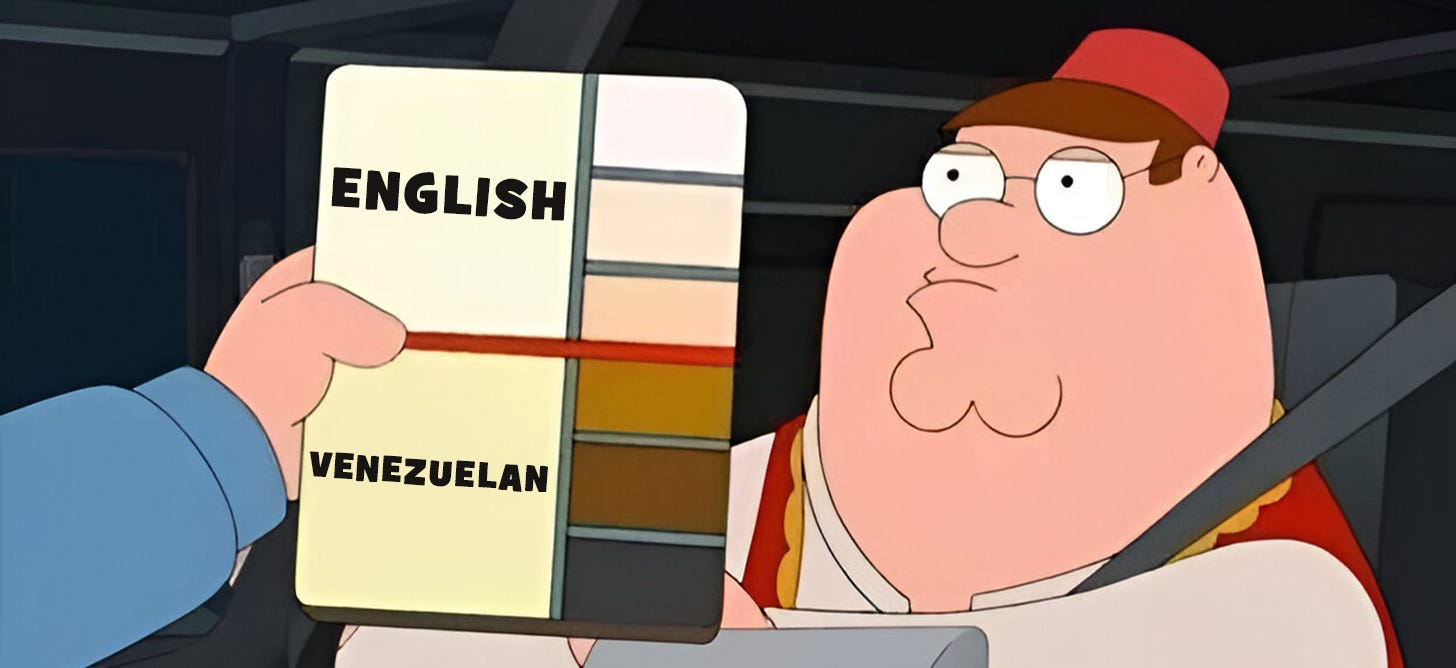Why I Love Being "Mixed Race"
I, Francis Foster, am a “white” bloke. It would be difficult to find a man who looks or sounds “whiter” than me. But the truth is, I’m “mixed race”, “bi-racial”, of “dual heritage”, or whatever the politically correct incarnation of the term currently is. My mother is Venezuelan, and of Lebanese, Italian and Indigenous heritage. My father hails from classic English-Irish peasant stock. Mix all those flavours together, and what emerges is a man who looks… Jewish.
This “Jewishness” is the result of my Lebanese grandfather’s semitic features combining with my father’s Irish pallor to produce a pretty convincing replica of one of “God’s chosen people”. In fact, the resemblance is such that I’m often mistaken for one on the internet. And by “mistaken” I mean: subjected to racial abuse on an almost daily basis. But these comments don’t bother me. Frankly, I’m far too busy controlling the media and the global banking system to pay them much heed.
People had issues with my appearance before I was even born. A family friend expressed deep concern with my very conception, worrying that I’d be born with curly hair - a rather absurd apprehension, since my mother’s thick black locks had not the slightest kink to them. Then when I was actually born, my Venezuelan grandfather bestowed upon me the nickname of “el mono blanco” (“the white monkey”) on account of my supposedly simian features and pale complexion. I was also called “musio”, a colloquial Venezuelan term meaning “foreigner”. The impact of these various digs was not softened by the fact that it was my own family hurling the insults.
I didn’t fare much better at school. I grew up in South London in the Eighties, where racist organisations like the National Front still held sway over the less discerning members of the population. In this climate of fear, my parents scrapped original plans to call me Francisco Jaime, worried that the foreignness of it would attract bullies at school. So instead, they gave me the name of a middle-aged woman: Francis.
I was always being asked, “Are you English or Venezuelan?” My typical response was, “When I’m in England, I’m English. When I’m in Venezuela, I’m Venezuelan.” A good answer, but not entirely truthful. In reality, I felt detached from both cultures. I felt like an outsider, wherever I was.
For years, I nurtured resentment at these comments from both English and Venezuelan people about my appearance and heritage. But if there’s one thing I’ve become good at in life, it’s turning pain into purpose. I’m now grateful for these experiences, because they’ve shaped who I am today. They drove me to pursue careers often regarded as the preserve of outsiders; comedian, writer, commentator. Who better to observe society than someone who has always stood apart from it?
Feeling detached from a culture can make one more aware of its idiosyncrasies, and better equipped to dissect them. And you also needn’t worry about being ostracised or cast out from a group that you never felt part of to begin with. It’s actually an advantageous position, in many ways. I’ve weathered attacks from comedians, teachers, antisemites, woke activists, right-wingers, and my own friends and family - and all it’s done is make me more resilient. If the choice is between speaking my mind or blending in, I’ll always choose the former.
My dual heritage is also a constant reminder of how lucky I am to live in the West, where I can freely voice my disdain of our political leaders. Do that in Venezuela, and you’d better be ready to grab what you can and flee the country. Even as a child, I remember the profound sense of relief I felt when our flight from Venezuela touched down on UK soil. Everything here seemed blessedly structured and ordered compared to the chaos of my mother’s home country - and that’s truer today than it ever was.
Ultimately, I’ve come to realise that my identity isn’t defined by how others perceive me or the labels they assign. It’s defined by my experiences, my values, and my gratitude for the life I have. I’ve learned to embrace the contradictions within me: English and Venezuelan, insider and outsider, accepted and misunderstood. This duality is not a burden - it’s a strength. It gives me a unique vantage point, helps me to speak my mind, and makes life altogether more interesting.
In fact, if I ever had to adopt a superhero alter-ego, I know what name I’d use: The White Monkey.



As a middle aged woman called FrancEs I must pull you up on this..Haha!
If you are a FrancIs that is the MALE form of the name.
Francis like HIS & Frances with a E like HER.
I'm always being called a Francis which really annoys me.....I don't understand why if I sign my name Frances people respond by changing the spelling I have used to Francis!!!
So anyway fear not yours is not a woman's name after all!!!!
Hope you don't mind my 'frankness'...
Frances
El Blanco Mono figured out that outsiders are more bad ass and sanity is for the weak!
Legend